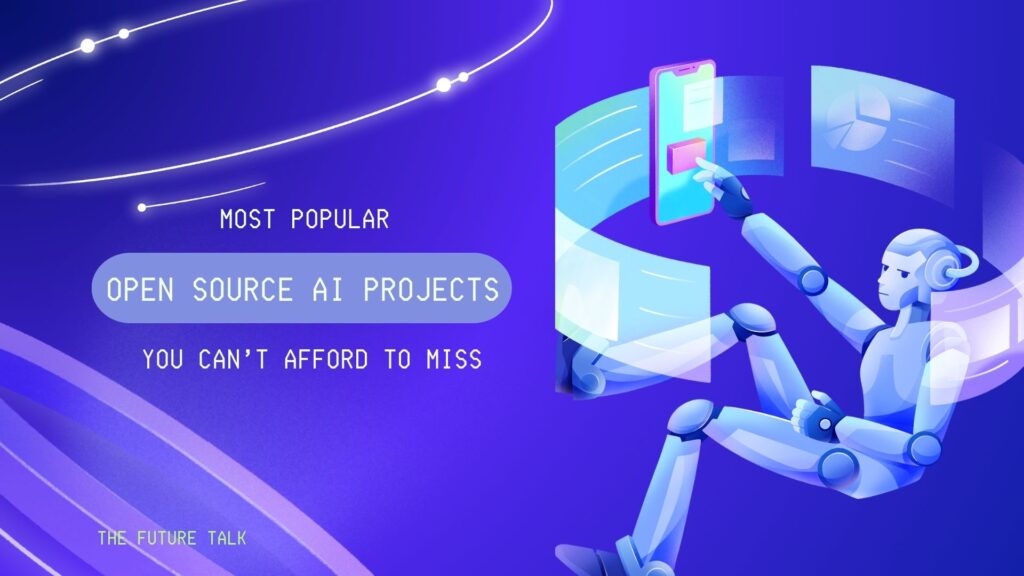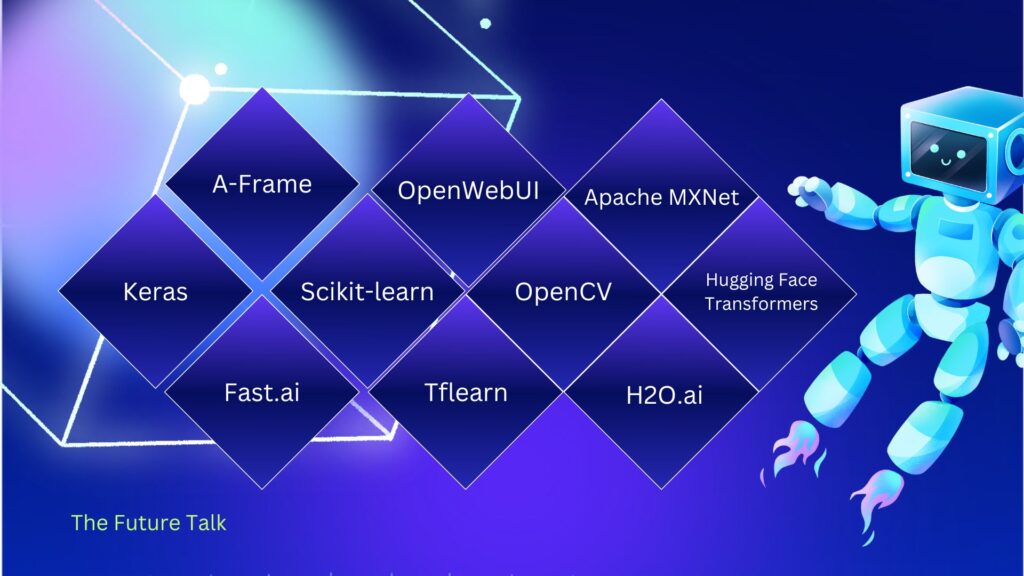As AI innovations are accelerating at a breathtaking pace, we have compiled a list of top Open Source AI projects poised to drive innovation and shape the future.

Artificial intelligence (AI) has revolutionized various industries, transforming their processes and operations. In recent years, we have also seen multiple forms of AI that have sparked a different level of innovation as well as created debate around its use. Among the AI developments, open-source AI projects are driving and democratizing access to advanced technologies.
Open-source AI projects are defined as AI software and tools that are available and easily accessible for anyone to use under various open-source licenses. In this article, we will discuss the most popular open-source AI projects that have garnered traction and allow you to use them to build software applications.
Also Read: The Ultimate Glossary: AI Terms You Can’t Afford to Miss
Open Source AI Projects – What and Why?
Considering the 2023 State of Open Source report, 80% of people noted that the use of open-source software has surged in their organizations in the past year. On the other hand, 41% cited a substantial increase.,
Open Source AI offers various significant advantages for researchers, developers, and organizations. Some of the advantages are as follows:
- Open-source AI platforms allow individuals to create diverse use cases based on their needs. These may include medical image analysis, real-time fraud detection, personalized recommendations, and more.
- As open-source AI projects and models are publicly available, researchers, developers, and organizations can utilize them to design and develop software applications.
- The readily accessible nature of open-source AI connects organizations with a diverse community of developers who are continuously contributing to the development of AI tools.
Apart from the numerous benefits of Open Source AI, there are certain challenges that also must be considered.
- Security Concerns
- Algorithmic Biasness
- Risk of Misalignment and Failure
- Data-related Issues
- Outsourced Technology Risks
Also Read: Top Countries With Most Artificial Intelligence (AI) Startups
Top Open Source AI Projects For Innovation
The world of technology is dynamic and rapidly changing. Staying up to date on the latest software developments is difficult. We have featured here the most popular open-source AI projects and platforms and how you can make them for you for the next tech revolution and innovation.
These open-source projects not only democratize access to AI tools but also encourage innovation and collaboration among researchers, developers, organizations, and enthusiasts. So, let’s get started.

1. A-Frame
Co-created and maintained by Diego Marcos, A-Frame (github.com/aframevr/aframe) is a framework designed to make AR/VR and 3D content development accessible to anyone in web browsers. This open-source AI platform has enabled tens of thousands of developers worldwide.
Key Features:
- Handles the 3D and WebXR boilerplate.
- Offers an entity-component architecture for three.js.
- Cross-platform support.
2. OpenWebUI
Another one of the top open-source AI projects is OpenWebUI (openwebui.com). powered by a web interface, OpenWebUI is making LLMs and AI more secure and private.
Key Features:
- Self-hosted interface for AI.
- Made by Open WebUI Community.
3. Apache MXNet
As an open-source deep learning software framework, Apache MXNet (mxnet.apache.org/versions/1.9.1/) trains and applies deep neural networks. This open-source AI model is designed to be scalable and allows fast model training while supporting a flexible programming model with multiple programming languages.
Key Features:
- Supports symbolic and imperative programming
- Deep integration into Python and support for Scala, Clojure, Java, C++, Julia, R and Perl.
4. Keras
Keras (keras.io) is a Python-based open-source library leveraged by NASA, NIH, CERN, and many other scientific organizations worldwide. This open-source AI platform is available for JAX, TensorFlow, and PyTorch. With Keras, you can build models that can move across framework boundaries and benefit from the ecosystem of all three of these frameworks.
Key Features:
- Enables fast experimentation with deep neural networks
- User-friendly and approachable API, especially beneficial for beginners
- Offers the low-level flexibility to execute arbitrary research ideas
5. Scikit-learn
Scikit-learn (scikit-learn.org/stable/) is a free and open-source machine learning library. Built on NumPy, SciPy, and matplotlib, this AI framework is open to all and reusable in various contexts. It focuses on classical machine learning algorithms and data analysis tools.
Key Features:
- Easy and efficient tools for predictive data analysis
- Multiple tested and documented algorithms for common tasks
- Active community and extensive learning resources
6. OpenCV
Open Source Computer Vision Library, or OpenCV, is amongst the top open source AI projects. OpenCV (opencv.org) consists of more than 2500 algorithms and is operated by the non-profit Open Source Vision Foundation. Its scalability allows it to adapt to organizational requirements, making it suitable for both startups and large enterprises.
Key Features:
- Highly optimized library with a focus on real-time applications
- Comprehensive library for image processing and deep learning
- Cross-platform support and integration with other programming languages
7. Hugging Face Transformers
Hugging Face Transformers (huggingface.co/docs/transformers/index) is a state-of-the-art machine learning for PyTorch, TensorFlow, and JAX. By using transformers, developers can gain APIs and tools to easily download and train state-of-the-art pre-trained models.
Key Features:
- Supports framework interoperability between PyTorch, TensorFlow, and JAX.
- Image classification, segmentation, and object detection.
- Provides the flexibility to utilise a different framework at each stage of a model’s life.
8. Fast.ai
One of the most popular open source AI projects is Fast.ai. By using Google Colab, you can use Fast.ai without any installation. As a deep learning library, this open-source AI platform is designed to make deep learning accessible to all by providing high-level APIs and pre-trained models.
Key Features:
- Provides high-level components for state-of-the-art results in standard deep learning domains.
- Simplifies complex concepts, and supports rapid experimentation.
9. Tflearn
Built on top of Tensorflow, Tflearn (/github.com/tflearn/tflearn) is an advanced deep learning library. This open-source AI tool provides a higher-level API to TensorFlow in order to facilitate and accelerate experimentation.
Key Features:
- Easy-to-use and understand high-level API for deep neural network implementation.
- Provides various built-in layers, activation functions, optimizers, and evaluation metrics.
- Easy graph visualization
10. H2O.ai
Trained on 6 trillion tokens, H2o.ai (h2o.ai) achieved over 80% accuracy on the 10-shot HellaSwag benchmark. This open-source AI platform offers various algorithms and automated tools for tasks, such as data preprocessing, model selection, and feature engineering.
Key Features:
- Provides enterprise-grade support.
- Offers seamless integration with widely used data science tools.
- User-friendly interface and visual workflows alongside API access.
These are some of the most popular open source AI projects available on platforms like GitHub.
Also Read: Top 10 Artificial Intelligence (AI) Models Made Headlines in Recent Years
Open Source AI projects enable researchers, developers, and organizations to inspect the source code. This ensures transparency and fosters trust in the software’s functionality and ethical considerations. As these projects result in collective efforts, leveraging them will continue to push the boundaries of AI innovations.
Embrace the potential of open-source AI and join the vibrant community driving AI innovation forward. What other AI projects and tools do you want to see in the future?
Stay tuned to The Future Talk for insights on AI developments and innovations. Comment your thoughts and join the conversation